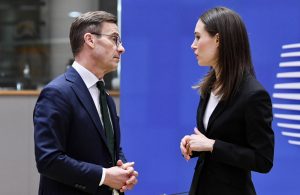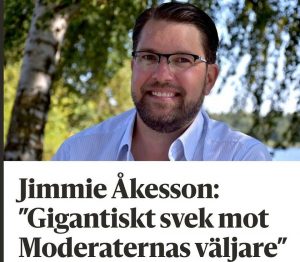The matter of Finland and Sweden's application has been pending in the Hungarian Parliament for several months.Continue reading
A new day, a new theory regarding why the government of Viktor Orbán is delaying the ratification of Sweden’s request to join NATO. Perhaps the most explicit to date has come from the Prime Minister’s political director, Balázs Orbán in a Facebook post on Thursday.
In his social media post the Fidesz politician writes that “the Swedish prime minister asks what the Hungarian MPs’ problem is. We help you understand with some examples:
3 March 2021.
Ulf Kristersson (then leader of the Moderate Party, now Prime Minister):
For the EU, a big part of the job is still to break Hungary’s development, put pressure on the Hungarian government and support the growing opposition.”
30 June 2021.
Jessika Roswall (then EU spokeswoman for the Moderate Party, now minister for EU affairs):
“What is needed now is a clear action by the EU to stop the new conditionality mechanism from making payments to Hungary.”
10 May 2022.
Johan Pehrson (then leader of the Liberal Party, now Minister for Employment and Integration):
“Hungary’s xenophobic and nationalist government continues to violate the rule of law and renounces support for Ukraine.”
As NATO, apart from being a military defense alliance, is also an alliance of values, one can hardly question the rationale behind one of its members objecting to granting membership to another that openly calls for breaking the first’s development.
It is astonishing that such disparaging statements should exist at all within the EU’s family of democratic nations,
not to mention the fact that calls to starve a member-state of European funds it is legally due, as well as to interfere in its internal affairs in support of its domestically unpopular opposition, casts a heavy shadow on the current state of European democracies.

The Swedish (L) and Finnish (R) Prime Ministers both see no reason why Hungary should not ratify their NATO membership request. Photo: Facebook Sanna Marin
It is important to point out that although Sweden has made some concessions towards Turkey’s demands, the other country blocking its NATO membership, no attempts were made by Ulf Kristersson’s government to clear up some of the points of dispute between Stockholm and Budapest. In fact, Sweden has not even made a conciliatory gesture towards the government in Budapest in order to clear out some of the contentious issues, neither did Finland as a matter of fact, and still approaches the issue of its NATO membership with a “sign here” attitude, letting Secretary General Jens Stoltenberg do all the talking and explaining.
The situation is all the more awkward since both current Swedish government parties are right-wing, conservative, at least on papers, something that should have opened the way to a normalization of relationships with Viktor Orbán’s national-conservative government. Instead, Kristersson’s European People’s Party (EPP) member Moderates have shown themselves no different from their predecessors, the Swedish Social Democrats, who have overseen the gradual relinquishment of checks on mass immigration, the rise in now endemic organized crime, and the free spread of radical gender ideology across the country’s educational, corporate and political system.
Some hopes were placed by Hungarian commenters on the influence of the initially right-wing Sweden Democrats in the government, yet these were not materialized either. Their leader, Jimmie Akesson, who has joined politics with a strong anti-immigration, Eurosceptic and pro-national-identity platform was himself hounded to the brink of depression in the past by vicious attacks from Sweden’s far-left, was forced to live under constant armed guard, and has considered leaving politics all-together. After his return a few years later, he has also opted to “broadening his party’s popular appeal”, which in conservative circles is a by-word for playing a silent partner to the left in return for a slice of the power. And that is exactly what the Sweden Democrats are doing at the moment.

The Leader of the Sweden Democrats complains about a betrayal by his coalition partners, the Moderates, in a social media post. Photo: Facebook Jimmie Akesson
The lack of any effort or communication from both NATO candidate countries, Finland and Sweden, has prompted the Hungarian government to send a parliamentary delegation to their Scandinavian counterparts a few weeks ago, but this has not succeeded in clearing up the heavy air between the sides. The continued lack of any attempt for a dialogue from Sweden’s side in order to neutralize the toxic and offensive remarks made by current government politicians in the past will probably prolong the process of accession until at least the Turkish side keep opposing Sweden’s NATO membership.
Featured Photo: Facebook Ulf Kristersson